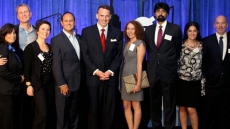Scientists have found mounting evidence that helps explain how humans have excelled in "relational reasoning" or superior reasoning.
"Relational reasoning" is a cognitive skill in which we understand patterns to make sense of seemingly unrelated information.
Subtle shifts in the frontal and parietal lobes of the brain are linked to superior cognition.
"This research has led us to take seriously the possibility that tweaks to this network over an evolutionary time scale could help to explain differences in the way that humans and other primates solve problems," said principal investigator Silvia Bunge, neuroscientist at University of California, Berkeley.
"It is not just that we humans have language at our disposal. We also have the capacity to compare and integrate several pieces of information in a way that other primates do not," Bunge noted.
The frontoparietal network in the brain plays a key role in analysis, memory retrieval, abstract thinking and problem-solving.
Anatomical changes in the lateral frontoparietal network over millennia have served to boost human reasoning skills, explained researchers.
"Given the supporting evidence across species, we posit that connections between these frontal and parietal regions have provided the necessary support for our unique ability to reason using abstract relations," said Michael Vendetti from University of California, Berkeley.
Humans were found to use higher-order strategies to guide their judgement while non-human primates relied more on perceptual similarities and were slower at reasoning and problem-solving.
"The findings allow us to gain insights into human intelligence by examining how we got to where we are by examining our changes across both evolution and development," Bunge concluded.
The study appeared in the journal Neuron.





